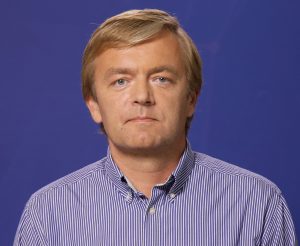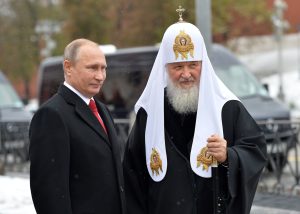
Alar Kilp is a lecturer in Comparative Politics, University of Tartu (Estonia).
Russia’s war of aggression against Ukraine lacks legitimacy, and the role of the Russian Orthodox Church (ROC) in endorsing Russia’s war effort lacks justification. Moral assessment of the situation is unambiguous. Ambiguity does exist, however, over the questions of whether the conflict has a religious dimension and what specific role religion has played in the year since the full-scale Russian invasion of Ukraine began on 24 February 2022.
Not a Religious Conflict?
The key concept in the study of religion in the Russian invasion of Ukraine is the “sacred.” Sacred objects are ideas, places, persons, and symbols that are “set apart” for the (Russian political) community and are treated with the highest respect or ultimate concern. The problem is that media and academia tend to ignore the perceived “sacred,” which is at stake for Russia and behind its “special military operation,” and tend to either over- or underemphasize the directly religious dimension of the Russian invasion of Ukraine.
Overemphasis is manifest in discussions over the question “Is it a holy war [for the Russian Federation]?” However, attempts to categorize the Russian invasion of Ukraine as a religious holy war reveal there are more features missing than existing: the war was not started with religion-related conditions and negotiations, was not proclaimed by religious authority, and has not been conducted as a religious pilgrimage.
The widespread but false assumption of Russians’ and Ukrainians’ shared Christian Orthodox tradition and Orthodox Church has been the main reason why scholars of “peace and conflict” have underemphasized religion’s role and have not treated post-2014 Russian aggression in Ukraine as a sample case of religious inter-ethnic or inter-state conflict. Recently I skimmed studies published in three top-level conflict resolution journals—Journal of Peace Research, Conflict Management and Peace Science, and Journal of Conflict Resolution. I found that articles studying religion and conflict did not include post-2014 conflict in Ukraine as a sample case because it is not considered a religious conflict. Rather, when this conflict was studied, the conflict was approached as an inter-state conflict or a conflict between the Russian Federation and NATO. As a result, searches using the keywords religion and conflict/war yield virtually no articles about post-2014 Russian aggression in Ukraine in this type of scholarship.
Thus, academia and media seem to operate between two extremes—the conflict is either not about religion or it is about “holy war,” pure and simple. Hopefully, one day the conflict will end or de-escalate. When that day comes, it will be important to understand the very real role and function that religion had in the conflict’s escalation and duration.
Sacred Territory
The core “sacred” at stake for the Russian Federation is secular: territory and state and imperial nationalism. Most of the disputed territory overlaps with the perceived canonical territory of the ROC. However, for both President Vladimir Putin and Patriarch Kirill the territory, state, and boundaries of the state are holy and sacred. They both sacralize Russia and the military defense of it but not the war itself.

Since February 2022, Patriarch Kirill has repeatedly blessed and prayed for soldiers. In his sermon of 25 September 2022, he famously claimed that the Russian soldier dying in the battle has made a sacrifice “that washes away all sins.” Earlier he affirmed that faith makes soldiers invincible because faith takes away their fear of death.
According to Kirill, Soviet soldiers in World War II “turned to the Lord”—there were “no atheists in the trenches”—and were “strengthened by the power of God.” Such reconstruction of the religiosity of Soviet soldiers is, of course, an instrument that highlights the sacred nature of World War II in the Russian public’s mind and is not about pious adherence to Orthodox religion or discussion of its political theology. At the 2022 celebration of WWII Victory Day, President Putin affirmed similarly that “the defense of our Motherland when its destiny was at stake has always been sacred.”
True Sacred
Kirill’s contribution to the war effort has manifested itself in the cultivation of commitment to the self-sacrifice of soldiers and compatriots in the name of the imperial nation. In his sermon of 25 September 2022, the word sin was mentioned just once. Sin and religious salvation were not the message of the sermon. The sermon was dedicated to the profession of a soldier—his professional oath, calling, and self-sacrifice for all others.
I analyzed a sample of Kirill’s messages (68 sermons, prayers, the Patriarch’s words after liturgy, addresses, reports, etc.) from February 2022 until the end of September 2022. Patriarch Kirill never used the term holy war. As mentioned earlier, for him Russia is holy, not war. But even the expression holy Russia was found less often than [self-]sacrifice.
Before 21 September 2022, when partial mobilization to army service and the intent to annex occupied Ukrainian territories to the Russian Federation were announced, Kirill used the term sacrifice 17 times; during 10 days at the end of September, however, he used this term 38 times. His messages were dedicated to sacred civic duties and sacralizing the secular profession of army service.
Patriarch Kirill has also reinterpreted the historic experience of the Soviet army by claiming that in the past atheists were absent and only believers fought:
For the people of Russia, the memory of the Great Patriotic War and the sacrificial feat of their ancestors is truly sacred: it has become an integral part of the national cultural code and our identity.
Here truly sacred is defined not with reference to religion but based on two sacred properties of (imperial) nationalism—people’s sacrifices in the name of national territory and sacred territory. Around that core, Russian President Vladimir Putin has accused Western countries of following “pure Satanism,” and Patriarch Kirill has claimed Western culture to be committed to “expelling religion from public space.”
As we see, both Putin and Kirill have utilized religious othering; thay have claimed God to be on their side. However, the conflict at its core is not about the political theology of Orthodoxy. The ROC under the leadership of Patriarch Kirill has become an instrument of the sacralization of secular imperial nationalism.
